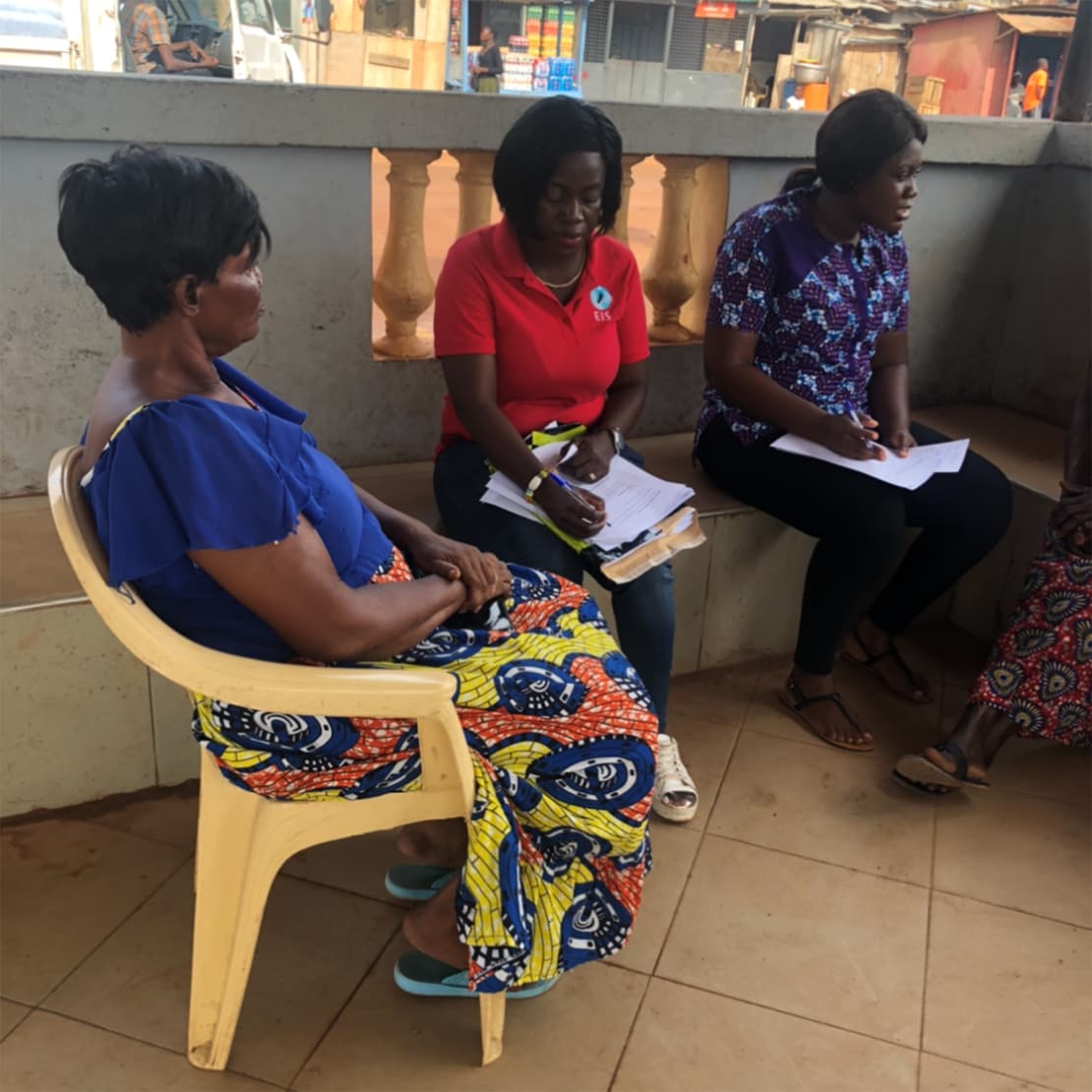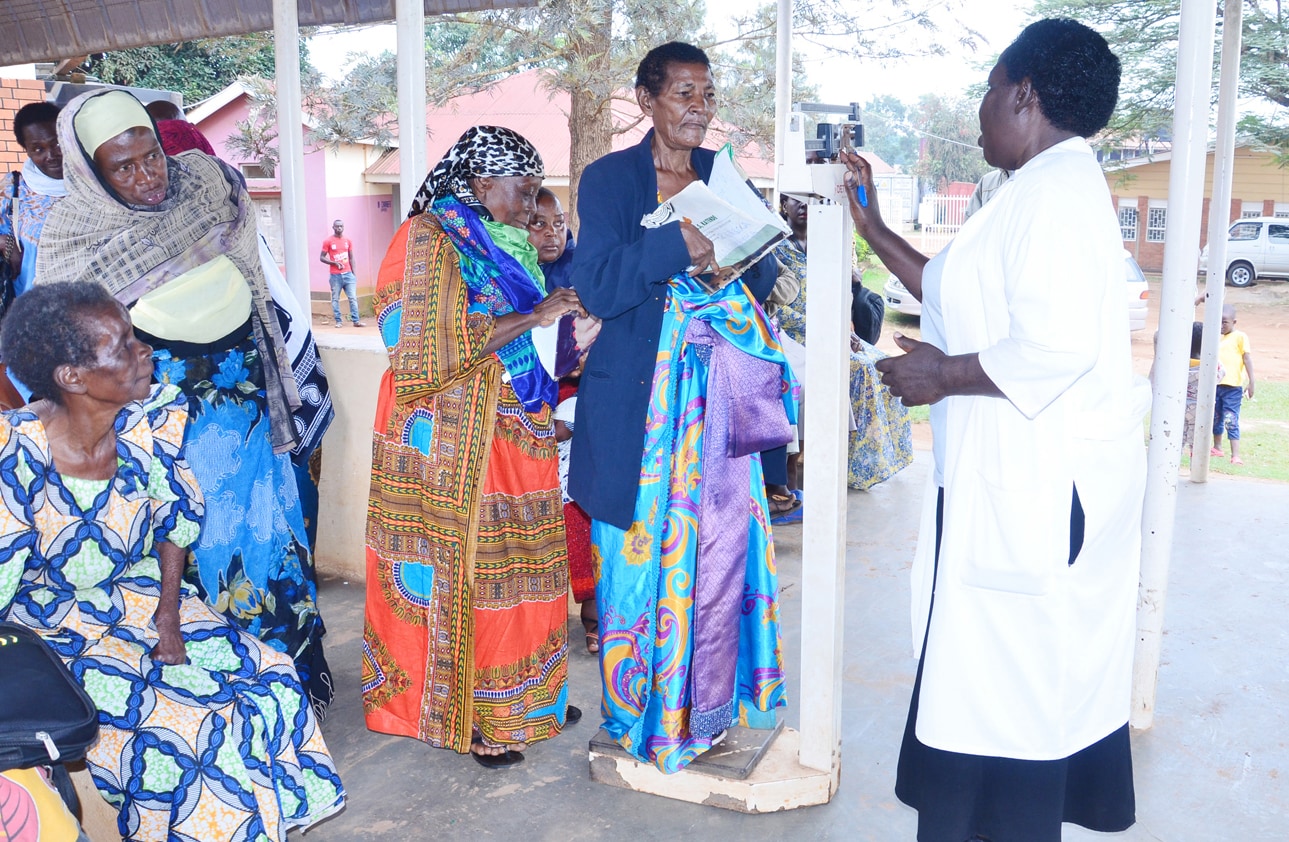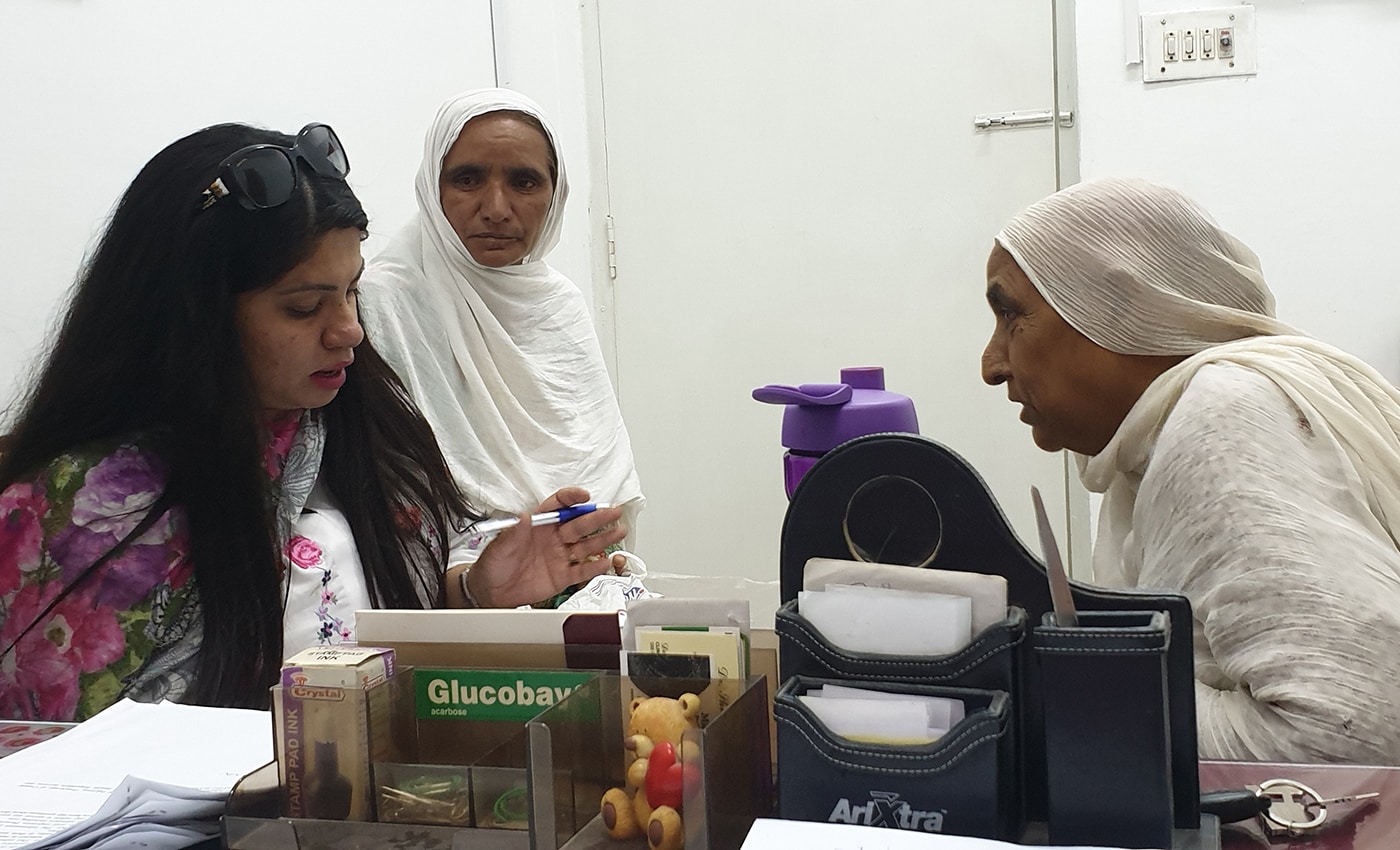Small Change Can Make a Big Difference
October 16, 2020
In advance of World Hypertension Day, we are highlighting the stories of a few small grant recipients who recently completed investigations on preventing premature death by increasing awareness, diagnosis, and treatment of hypertension (elevated blood pressure).
Each year, CDC awards small grants to a select group of global field epidemiologists, also known as “disease detectives,” in collaboration with the Training Programs in Epidemiology and Public Health Interventions Network (TEPHINET) and other partners. The competitive grant program supports current residents and recent graduates of the Field Epidemiology Training Program (FETP) in leading projects that strengthen health systems by addressing health needs and preventing health crises. Grantees receive mentorship from local and global experts.

Project principal investigator Dr. Christabel Ayepah and a team member interview participants during a blood pressure screening in Ngesia, Ghana. Photo: Christabel Ayepah
Christabel Ayepah, MBChB, MPhil, FETP graduate, of Ghana began noticing younger and younger patients coming into her local health center with diabetes and hypertension. “Most were unaware of their risk of developing cardiovascular disease,” she explains.
Christabel saw the small grant program as an opportunity to educate her community about the consequences of high blood pressure, increase blood pressure screening, and better understand what prevented people from accessing regular care.
Christabel and colleagues arranged a series of blood pressure screening events in the community. “A number of the participants at the blood pressure screening had not visited health facilities for years,” she explains.
During the screenings, Christabel together with doctors, nurses, disease control officers and laboratory technicians educated participants on hypertension risk factors and registered participants with elevated blood pressure on the National Health Insurance Scheme, linking them to care. After the screening, Christabel and colleagues worked with local facilities to track follow-up for care and to identify patient barriers to seeking follow-up care.
Christabel shared her findings with her FETP peers and the Ghana Health Service, part of Ghana’s Ministry of Health. Based on her findings, the Ghana Health Service decided to implement policies and strategies to improve blood pressure management, including putting in place recommendations to decrease barriers to follow-up care. Wellness centers at health facilities were also established to encourage blood pressure monitoring at the community level and health education was increased in mainstream and social media.

A health worker at a health center in Kasangati, Uganda takes height and weight measurements. Photo: Ivan Ssemuko Kiggwe
Jackline Nanono, MPH candidate, FETP graduate, of Uganda initially became interested in helping people manage their hypertension while working with patients with HIV. “I would see patients with HIV debilitated by noncommunicable diseases,” recalls Jackline. “I decided to focus on hypertension since it’s easy to diagnose and can be screened cheaply by a health worker.”
Seeing an opportunity to increase hypertension diagnosis at primary health centers in Uganda, Jackline wanted to better understand what prevented health workers from more readily screening and diagnosing patients. Through observation and interviews, Jackline uncovered shortages of staff and functional diagnostic equipment like blood pressure measurement devices, as well as delays in required trainings.
Jackline has shared her findings with health facilities and municipal and district health officers. She plans to continue discussions with district health officials and the Ministry of Health to encourage regular equipment maintenance and trainings for health workers.
“We know that routine screening coupled with appropriate health education can help clients identify and treat hypertension early on. Such a small intervention can help reduce devasting effects at both the individual and the health system levels,” Jackline explains.
Jackline hopes to see hypertension screening and diagnosis becoming routine and mandatory, preventing or delaying negative health outcomes and reducing costs for individuals and the health system. “Ultimately, I see early diagnosis of hypertension as contributing to a stronger health system in Uganda.”

Principal investigator Dr. Nadia Noreen interviews a patient at a hypertension clinic in a tertiary care hospital in Islamabad. Photo: Kamran Younis
Nadia Noreen, MBBS, MPH, MSc Epidemiology, FETP graduate, of Pakistan wanted to understand what prevented people with hypertension from taking their medication as prescribed. The health system in Pakistan, like many other lower income countries, struggles to provide care due to the high rates of infectious and non-infectious diseases. While newborn illnesses and diarrheal diseases take many lives in Pakistan, cardiovascular disease is the leading cause of death.
Although hypertension treatment is simple and effective, patients often struggle to follow the treatment plan to control their blood pressure. Nadia’s project revealed that a large proportion of patients were not taking their medicines as prescribed and that many patients could not afford the cost of prescribed medications. She noticed, however, that patients who reported receiving adequate counselling or who had a family history of hypertension or heart disease were more likely to follow their treatment plan.
“The rewarding part of the project was the interaction with patients,” explains Nadia, “listening to the issues that influenced the effectiveness of the counselling and patient’s compliance.”
Nadia shared her findings with hospital officials and the Ministry of National Health Regulations. Her project sheds light on the potential for affordability of medication to increase the number of people in Pakistan following their treatment plan. She hopes her findings will inform future policy and program decisions related to access to affordable medication and medical services.
Lasting Impact
Small grants projects are consistently linked to public health improvements including changes in public health practice and policy. In a 2016 survey from TEPHINET, over 70% of responding NCD grantees reported their projects led to policy or program changes.
“Combining modest financial support with strong mentorship and motivated project leads can change the cardiovascular disease burden one story and one community at a time,” states Dr. Qaiser Mukhtar of CDC’s Global Noncommunicable Diseases Branch.
As programs such as these build capacity to provide for patients in need of long-term care for chronic conditions like hypertension, health systems become more robust and better able to respond to all types of health threats.